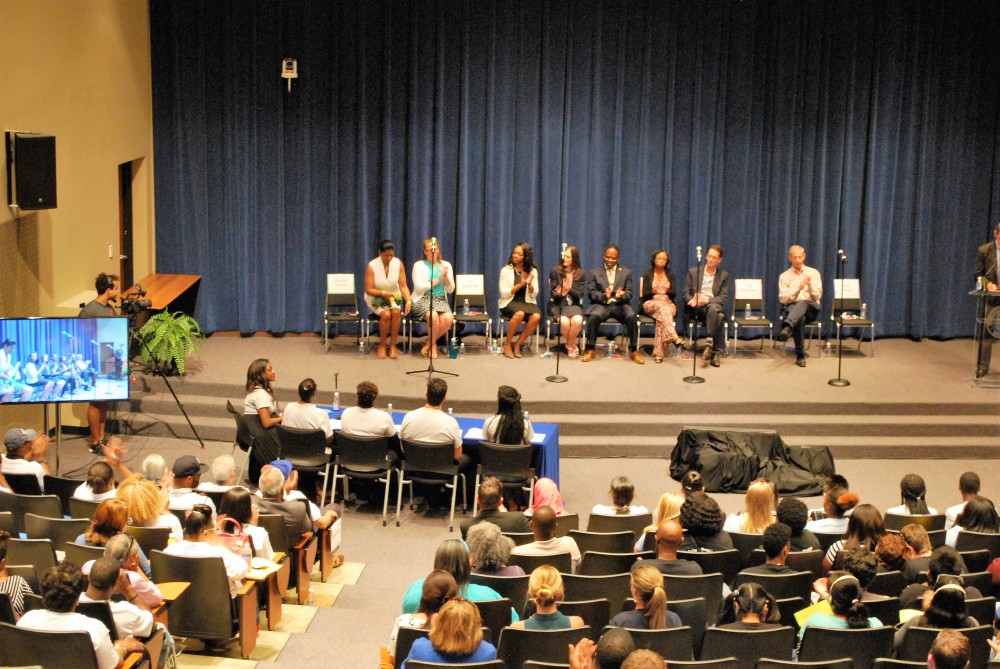A new diversity report on the rebuilding of Hillwood High School has been released. Dr. Leonard B Stevens, an expert in school desegregation, reviewed the proposals for the school district and concluded that Hillwood High School should be rebuilt at its current location.
The report describes in detail different information about the proposal followed by a conclusion statement. Below, I will summarize the information in the report and copy and past the conclusion for each section.
The report says the current site of Hillwood High School has equal driving time for those who live both north and south of the school.
Conclusion: In assessing the current location of Hillwood High School and the alternative sites, the district should seek to locate the school where it is reasonably central to the students it serves so that travel time and travel distance to the school for students and families have both the reality and the appearance of fairness.
When looking at the diversity of the Hillwood, the school is currently a plurality school because of the presence of zone option students, including students from “Black zoned options.” Movement of the school could risk removing these students from the school and would create a smaller and whiter population at the school.
Conclusion: since the Pearl-Cohn students are indispensable to the diversity of Hillwood High School and in light of the district’s commitment to diversity, the district should place significant weight on this factor and avoid a location decision that places the school’s diversity at risk and, in particular, its plurality school status.
The Office for Civil Rights, U.S. Department of Education is currently monitoring student assignment matters in the district.
Conclusion: In light of this ongoing review, the district should ensure that its decision on the Hillwood location matter is consistent in all respects with its Diversity Management Plan.
The report goes on to look at the schools in the cluster that meet the district’s diversity plan.
Hillwood High School, H.G. Hill Middle School, and Charlotte Park Elementary School are plurality schools that meet the district’s diversity plan.
Bellevue Middle, Westmeade, Harpeth Valley, and Gower do not meet the district’s diversity plan. Harpeth Valley is the school with the highest population of White students in the cluster, with 76% of student labeled as White.
If the new Hillwood High School is located south of the current location, it would mean moving the school towards a larger White population and away from the Black population in the north.
“The district should be sensitive to the potential for generating perceptions that this school location decision, however unintentionally, would disfavor Black students or students of color who live north of Hillwood High School and thereby could become a basis for racial distrust of the district.”
Conclusion: The district should seek to make a decision that affirmatively contributes to public confidence in the district’s expressed commitment to “preserve, support and further” diversity.
Fewer than half of the high school students zoned for Hillwood attend the school. Almost 450 high school students attend high school outside of the cluster. Why is that?
Conclusion: This is an opportune occasion for the district to review the Hillwood cluster at all grade levels with a view toward the potential to strengthen the attractiveness of the cluster’s schools to families living in the Hillwood cluster-as-extended. The study should explore program offerings, grade organization, and possible development of a Pre-Kindergarten center as strategies to attract cluster students to cluster elementary and middle schools and ultimately to Hillwood High School.
The report ends with the overall recommendation:
Overall Recommendation. The best next step for the district is to rebuild Hillwood High School at its present site.
Here are the four reasons the report lists as why the district should rebuild Hillwood High School on the location:
- First, a premise that locating the school in the Bellevue area would place it closer to a larger share of its students is not supported by the data, which show that the current location serves about equal proportions of students who live north and south of the school.
- Second, a premise that relocating the school to Bellevue would accommodate population growth in the area is not supported by enrollment projections which foresee modest growth of fewer than 70 students by 2020 at Hillwood High School, leaving the school well within its capacity.
- Third, an assumption that relocation of the school to the Bellevue area would cause more students in this area to use Hillwood High School is speculative—this issue has not been studied— and, in addition, is undermined by the fact that 447 potential Hillwood High School students are choosing to attend MNPS magnet high schools instead. It seems unlikely that such students in substantial numbers would change their high school plans based on relocation of the cluster comprehensive high school. It is more likely that capturing more cluster students in cluster schools will require changes in the schools that students and families find sufficiently attractive.
- Fourth, a premise that relocating the school to Bellevue would do no harm to the school’s current diversity status as a plurality school is a high risk assumption that does not place sufficient weight on the significance of the Pearl-Cohn students who attend the school through Zoned Options or open enrollment. Among the factors described in this report leading to the recommendation to rebuild on the current Hillwood High School site, the diversity factor is the most significant.
For more on education politics and policy in Tennessee, follow @TNEdReport.


